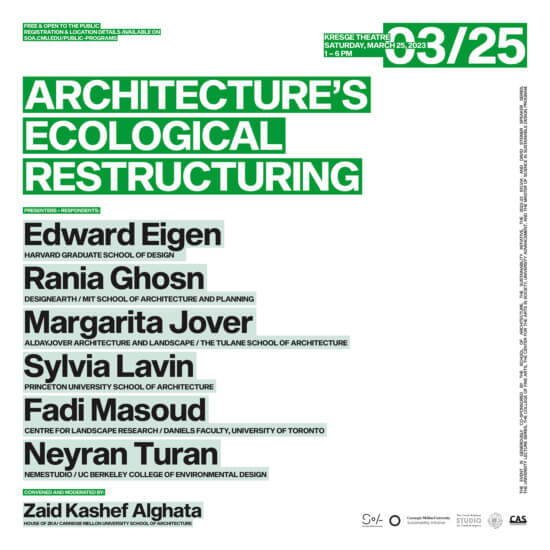It’s March, which means students at architecture schools across the country are gearing up for midterms and mid-semester reviews. If there’s time to dip out of the studio—or if you’re a professional who wants to return to school for a day—here is a roundup of not-to-be-missed spring semester symposia.
Symposia descriptions have been edited and condensed for clarity.
Harvard Graduate School of Design
Grand Paris Express: Reconfiguring the City through Radical Infrastructure
March 2–3
Established in 1986, the biennial Green Prize recognizes projects that make an exemplary contribution to the public realm of a city, improve the quality of life in that context, and demonstrate a humane and worthwhile direction for the design of urban environments. Eligible projects must include more than one building or open space constructed in the last 10 years.
The 14th Veronica Rudge Green Prize in Urban Design has been awarded to the Grand Paris Express, a large-scale transit project currently being built in and around the Paris metropolitan area. Through carefully articulated design interventions, the Grand Paris Express illustrates the potential for the planning and execution of mobility infrastructure to transform a city and its region. Société du Grand Paris, a national agency responsible for designing, creating, and implementing the Grand Paris Express, will receive the honors for the prize in recognition of their continued stewardship behind the project.
A public event and reception for the exhibition is on March 2. There are two associated workshops scheduled for March 3.

Princeton School of Architecture
Svetlana Kana Radević: Aggregate Assemblies
March 2–3
The seventh Womxn in Design and Architecture Conference at the Princeton School of Architecture honors the life and work of Svetlana Kana Radević. The 2022-23 conference proceedings will call on the discipline with timely topics and inquiries, such as What is architecture’s role in times of social and political transformation? How can architecture re-center local systems of power, collective memory, and vernacular tradition? Disrupting the dichotomy between periphery and center while standing as one of the most avant-garde voices of Yugoslavian architecture, Radević’s legacy raises questions that are as pressing now as they were during her lifetime.
View this post on Instagram

View this post on Instagram
Cornell University Art, Architecture, and Planning
FRINGE: New Centers for Architecture & Urbanism
March 2–3
Containing some of the world’s most intensely altered rural-urban contexts, East and Southeast Asia have provided a fertile seedbed for research on global FRINGE architecture and urbanism. Bringing together innovative design and research through the lens of the built environment, this symposium questions: How do the material and technological changes brought about by urbanization collide with the spatial, cultural, and social practices of the rural? How do such meetings create or alter the special conditions of agency and interconnection, from the digital to the traditional, from the informal to the infrastructural, within the rural-urban?
The hybrid symposium and the accompanying exhibition (February 28–March 23 in the Bibliowicz Family Gallery) aim to unpack the FRINGE’s spatial, ecological, and technological capacities to reveal innovative design strategies that strive to be more environmentally conscious, socially equitable, and architecturally adaptive.
Rice University School of Architecture
More than Fifteen Years: Six Takes on Housing After the Neoliberal Turn
March 2–3
This symposium aims to expose local architects, stakeholders, as well as students to alternative approaches and research on the housing question. The critical assessment of the discussed models and practices, and their potential adaptation and adoption under the crucial consideration of local socio-economic, political, environmental, and cultural forces, will contribute to an expanding discourse on contemporary dwelling in Houston and beyond.
View this post on Instagram
RISD Architecture
Sensing the Environment: Evidence, Narrative, Appearance
March 7
Climate change is an art of sensing and imaging, just as much as it is a science of analysis. Under what circumstances do we “see,” “know,” and “evidence” the environment?
This multidisciplinary symposium builds on existing momentum and discourses at RISD around sustainability and just climate futures — this time, focusing on its critical possibilities. It expands the visual project of rendering climate visible, diversifies voices and actors, and challenges power differentials latent in representations of the environment.
This event and parallel exhibition aim to decenter visual mediums of quantification and extraction; to mobilize a collective aesthetics and politics of “the environment”; and to catalyze discussions on how climate agency might be exercised through visual research, acts of design, and creative practice.
Weitzman School of Design at the University of Pennsylvania
Housing Justice Futures: Philadelphia Forum on Design, Race, and Climate Change
March 16–17
As we contend with our moral and ethical responsibility for the well-being of people and the planet, this forum will consider housing design and policy at the intersection of race and climate change.
Engaging researchers, and practitioners, and community stakeholders, we will examine the historical inequities that precipitated the housing crisis in Philadelphia and other US cities while considering actionable strategies for housing justice in the future.

Carnegie Mellon University School of Architecture
Architecture’s Ecological Restructuring
March 25
A workshop-style symposium will bring together individuals Edward Eigen, Harvard Graduate School of Design; Rania Ghosn, MIT School of Architecture and Planning; Margarita Jover, The Tulane School of Architecture; Sylvia Lavin, Princeton University School of Architecture; Fadi Masoud, The John H. Daniels Faculty of Architecture, Landscape, and Design; and Neyran Turan, UC Berkeley College of Environmental Design, to discuss the “ecological restructuring” that happens within architectural work as it expands from technical solutions into task of offering visions that take into account political, economic, and cultural forces.
This afternoon of conversation is convened by Zaid Kashef Alghata, Joseph F. Thomas Visiting Professor at Carnegie Mellon University’s School of Architecture.
Syracuse University School of Architecture
Harry der Boghosian Fellowship Symposium: Pet Plants
March 29
Throughout the academic year, Lily Chishan Wong, the school’s seventh Boghosian Fellow, has been teaching an architecture studio and two professional electives focusing on her research project, “Producing Nature” that examines the use of vegetation in architecture and its spatial, socio-political and environmental dimensions.
Plants are the new pets. We share our homes with monsteras, work in offices with philodendrons, and grow calatheas in the lobbies of all our buildings. Plants are perhaps best understood as a “companion species.” As co-inhabitants of our world, pet plants have become the inspiration for a new aesthetics, and they serve equally well as tokens of well-being. Plants require constant care and are bred for optimized growth. They are legacies of empires and are at the same time technoscientific commodities. Staged through seven, human-plant performances organized as a “Pet Plants Symposium,” we aim to explore this new valuation of plants and speculate on new forms of engagement with all manner of vegetal beings.
Cooper Union The Irwin S. Chanin School of Architecture
Order!: The Spatial Ideologies of Carbon Modernity
April 1
Pulling from the new spatial order that has emerged following the industrial revolution, this sysmposium will comprises three sessions with presentations on carbon modernity and the abstarction of carbon modernity. Among the presenters are architects, designers, scholars, historians, and theorists.
Kent State University College of Architecture + Environmental Design
Environmental Justice, Ecology, and Race
April 13–14
The 2023 Environmental Science and Design Research Institute (ESDRI) Symposium theme, Environmental Justice, Ecology, and Race, will call attention to issues concerning structural inequality; disparity and natural processes; climate justice; environmental conflicts and activism; and equitable environmental design. The convergence of the global pandemic, accelerating climate crisis, and social justice movements have re-exposed the breadth of environmental inequalities and the inextricable link between disparity and ecological harm. Addressing issues in our complex, the contemporary environment requires expanded conversations that confront latent systems of inequity and support more just social, natural and built systems. Indeed, recent governmental initiatives prioritizing the climate crisis and disadvantaged communities understand that “environmental justice is an important part of the struggle” in the obligation to improve and maintain clean and healthful environments. In 2021, the United Nations affirmed that a clean and healthy environment is a fundamental human right.
California College of the Arts
Climate as Praxis: Marking the Launch of the M. Arthur Gensler Jr. Center for Design Excellence
April 15
CCA Architecture will host a symposium about the urgency of climate change. This afternoon of exchange will bring together “four eminent practitioners whose work straddles the academic and professional realms and who are advancing new ways for designers to directly address the social and environmental effects of climate change,” according to the event’s description. “All four are actively engaged in creating buildings, landscapes, and communities that can support a more just and resilient future.” The speakers are Chris Cornelius, studio:indigenous and University of New Mexico; Billie Faircloth, Kieran Timberlake and Penn Design; Kate Orff, SCAPE and Columbia GSAPP; and Boonserm Premthada, Bangkok Practice Studio and Chulalongkorn University. The event also marks the launch of the M. Arthur Gensler Jr. Center for Design Excellence in the Architecture Division at California College of the Arts. As described by CCA Architecture, “The M. Arthur Gensler Jr. Center for Design Excellence was created through the generosity of the Gensler Family and the Gensler firm to celebrate the life and legacy of visionary architect, entrepreneur, and philanthropist Art Gensler.”

City College of New York Bernard and Anne Spitzer School of Architecture
Mass Support: Flexibility and Resident Agency in Housing
March 21–May 7
Symposium on April 26
Mass Support takes a look at the work of Stichting Architecten Research (SAR), a Dutch architectural think tank active active between the years 1964 and 1990 that rethought mass housing. This exhibition restages a prior version of the show that was on view at Eindhoven Technical University last summer. The new version additionally highlights ten recent projects that relate to the work and legacy of SAR—“from new models of social housing in Berlin and Barcelona to new applications of prefab construction in Beijing and Brooklyn,” according to press materials.
Columbia University Graduate School of Architecture, Planning and Preservation
Buell Dissertation Colloquium
April 28
The Temple Hoyne Buell Center for the Study of American Architecture’s biennial Dissertation Colloquium brings together a select group of doctoral students from diverse institutional and disciplinary backgrounds working on dissertation topics related to the history, theory, and criticism of architecture and the built environment in the Americas. The Colloquium has been held for over a quarter-century, and its purpose is to provide a forum for discussing significant new work by emerging scholars. This year’s colloquium will feature a Friday evening opening keynote by Joanna Merwood-Salisbury, Professor of Architecture at the Wellington School of Architecture.
Cornell University Art, Architecture, and Planning
This year’s hybrid symposium held by Cornell University’s History of Architecture and Urbanism Society aims to explore architectural histories that grapple with the scarring and marring of lands, buildings, and bodies caused by enforced occupation, violent displacement, and extractive practices associated with modernity under totalitarian, colonial, or neo-colonial regimes during the 20th century, in any part of the world.
As with other fields in the humanities, architectural history has been grappling with new ways to activate critical consciousness of the ongoing unjust systems of power-knowledge and address the coloniality of modernity in architecture worldwide. We ask: how can our histories of architecture unsettle the coloniality of race, violence, and place? How can we disturb the imperial imaginations that define modernism in and of architecture? Finally, can our work activate transformative practices of resistance and reinscription in both historical and architectural thinking?











